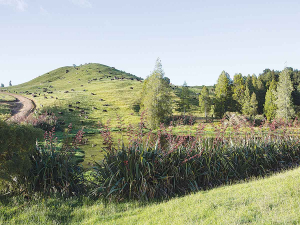DairyNZ opens applications for associate director role
DairyNZ is giving New Zealand farmers a unique opportunity to gain hands-on governance and leadership experience within the dairy sector.
 Funding will be available to support actions like installing mini wetlands, removing sediment, riparian planting, helping farmers with stock exclusion and developing farm plans.
Funding will be available to support actions like installing mini wetlands, removing sediment, riparian planting, helping farmers with stock exclusion and developing farm plans.
The Government has taken on board dairy sector feedback in its revised Essential Freshwater package but issues remain, says DairyNZ.
Over the last eight months the dairy lobby has advocated for an evidence-based and pragmatic approach to freshwater regulation.
DairyNZ chief executive Tim Mackle says it is pleased to see the Government has listened and made significant changes to some of the more controversial elements of their original proposal.
However, there’s still a sting in the tail, says Mackle.
“Like all New Zealanders, dairy farmers share ambitions for healthy waterways and have invested a lot of time and money for over a decade in improved management systems, upgrading effluent systems, riparian planting and fencing streams to exclude cattle.
“Looking at where the policy has landed, it appears that the Government have taken a better approach in terms of scientific rigour and practicality for farmers on the ground.”
The Government have parked the dissolved inorganic nitrogen (DIN) measure and removed the impractical and expensive requirement for farmers to move existing fences to meet new stock exclusion guidelines, two policies of great concern for farmers.
But DairyNZ is also concerned that the minister intends to revisit the DIN in 12 months.
Mackle says the proposed 95% protection standard will severely affect farmers in catchments who are already taking significant action towards reducing their footprint in line with new Regional Council policy plans.
For example, in Canterbury’s Selwyn and Hinds zones farmers are already working towards a 30% reduction in nitrogen. Under these new regulations, these reductions may need to increase to 70% to meet the standards being proposed.
“The Government and regional councils need to take a more nuanced approach when it comes to rolling out plans in regions where farmers are already undergoing significant change due to recent nutrient limits.”
The World Wide Sires National All Day Breeds Best Youth Camp Best All Rounder plaudit has become family affair, with 2026 Paramount Cup winner Holly Williams following in her sister Zara's footsteps.
DairyNZ is giving New Zealand farmers a unique opportunity to gain hands-on governance and leadership experience within the dairy sector.
Herd improvement company LIC has posted a 5.2% lift in half-year revenue, thanks to increasing demand for genetics.
According to the latest Fresh Produce Trend Report from United Fresh, 2026 will be a year where fruit and vegetables are shaped by cost pressures, rapid digital adoption, and a renewed focus on wellbeing at home.
The Roar is a highlight of the game hunting calendar in New Zealand, with thousands of hunters set to head for the hills to hunt male stags during March and April.
OPINION: The past few weeks have been tough on farms across the North Island: floods and storms have caused damage and disruption to families and businesses.